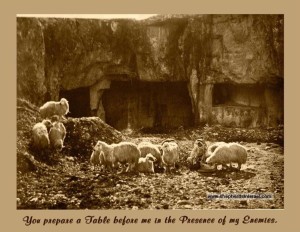Sabbath Pretense
by Elouise
When I was growing up, my parents and teachers sometimes made us say we were sorry for hurting or disobeying someone. Sometimes I pretended to be sorry. That’s because the way I saw it, it didn’t really matter whether we were truly sorry, or who was really in the wrong.
What mattered most was giving a convincing show of contrition, and shaking hands or hugging each other to signify the end of warfare. Doing whatever we needed to do to stay out of further trouble.
Dan Allender seems to think we’ve given pretense a bad name. In fact, he believes Sabbath is in part about “pretending peace.” Not in a deceitful way, but in a visionary way.
Check out any dictionary definition of “pretend,” and you’ll see emphasis on the negative side of pretending. We associate it with deceit, lying, trying to get out of trouble, and other savory and unsavory acts. We may want to create a favorable impression, or avoid hurting someone’s feelings, or be planning a surprise party. On the other hand, we may be planning to rob a bank. A little pretense goes a long way.
There are other ways of thinking about this. From my past life I have one strong, positive association with pretending. In the 1980s, when I was regularly attending 12-step meetings, I heard this saying scores of times: “Bring your body; your feelings will follow!”
In other words, if you don’t feel like coming to these meetings, just bring your body anyway. Pretend. Get yourself here. The rest will follow when you’re ready.
This isn’t about overnight miracles. It’s about pretending we are who we will one day become. Changed persons. It’s about developing a vision for who we might become even now. It’s about discovering things in other people we never thought we would find. Especially people we thought might be beneath us, or even outright enemies.
It’s also about living into the future that will one day be the present. Or at least trying on peace for 24 hours to see whether we can recover our lost vision. Not simply our vision of peace, but our more positive, hope-filled visions of each other.
Are we willing to risk liking or appreciating things in people we seem to need to hate, belittle or ignore?
Allender appeals to Psalm 23 in which God sets a table before us “in the presence of our enemies.” Sabbath is one such table. A day to create safety within our closest, often difficult relationships. An invitation to explore other ways of seeing each other, or to discover there’s more good and beauty in that person than we remembered.
To do this we need to practice our ability to pretend. This means we’re free to lay aside for one day what we think or fear might become permanent hostility. We get to enjoy a tiny taste of peace, a rest from the hyper vigilance of home-style warfare. We’re given instead an opportunity to glimpse what reconciliation might feel and look like.
It seems Sabbath isn’t for the faint of heart. It requires effort, courage, and willingness to step out of comfortable old roles. It also requires willingness to be surprised by what we see. Not just one day in seven, but as a possibility for all Sabbaths. Or even (God would not forbid it!) a reality for up to seven days in seven.
Here’s a concrete example from Allender’s book of what this might look like.
One Sabbath my wife asked me, ‘If we were to pray today for our enemies, who do you most hope not to be united with on this earth? And who do you most hope not to see until heaven?’ I nearly choked….Instead of pretending I have no enemies, she was inviting me to explore, to be curious about my enemies and to enter into a conversation that took me far beyond the typical guilt (‘I should do something’) or hopelessness (‘I can’t do anything’).
Dan B. Allender, Sabbath, published by Thomas Nelson (2009), pp. 112-113
Sabbath is upon us. Whom do I hate, belittle or ignore? And how might I begin pretending peace with that person?
© Elouise Renich Fraser, 26 June 2015
Photo image from shepherdsinisrael.com

We got to have ambitions for change, because change is the only constant in the Universe.
And, like someone else discovered, we can pretend we are anything. This guy whose story I read, he decided to pretend he was honest and see if he behaved differently. He went back and gave a shop-keeper a 50 cent refund that he had been overpaid, and the shop-keeper gave him a look he had rarely seen before that said, ‘I’m proud of you, son!’
That was the start of his changes for the better.
Lots of hugs!
Fran xxx 🙂
LikeLike
Great story! Thanks, Fran. I think we vastly underestimate the power of even a tiny change in behavior, repeated in small ways over time–even as an experiment!
Elouise
LikeLiked by 1 person
It is hard to get past the negative definition of pretend. I would offer “imagine” or “act” as some helpful alternatives.
LikeLike
David, Thanks for your comment. Imagining is good (in this case) when acted upon. It has to be more than just thinking about it. As for acting, it has always been part of pretending. Especially in young children. The make-believe worlds they inhabit and act out (as though they were real) are sometimes breathtaking. I think Allender may be inviting us to take a lighter, more child-like approach to pretending. Just a thought. I also agree that we adults (perhaps teenagers, too) find it easier to associate ‘pretend’ with deceit, rather than envisioning and acting out a more fruitful way of relating to each other.
Elouise
LikeLike